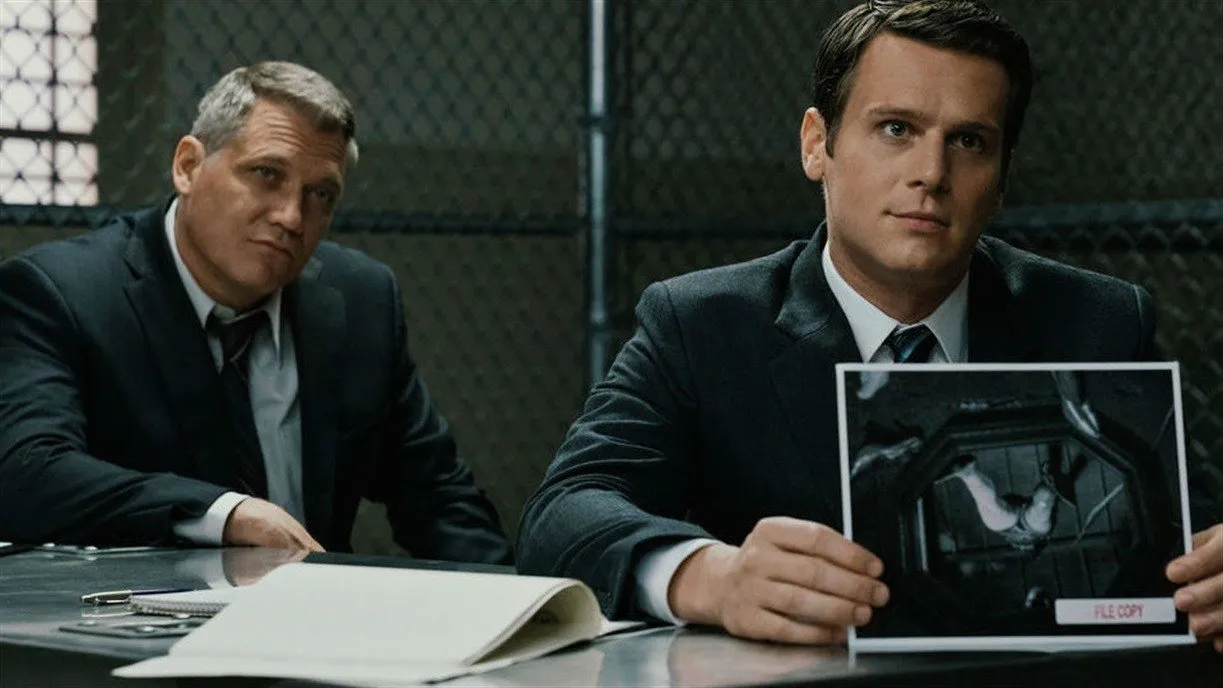Mindhunter is a story of cops and murderers where there is hardly any action or suspense. It's an office thriller and machine cafes, not alleys and guns. The criminals are persecuted with words and the shootings take the form of dialogue. There is a lot of talk about atrocious murders, but these are not shown on the screen. If we make a parallel with the filmography of David Fincher, the main director of the show, Mindhunter is more similar to Zodiac than to Seven.
>>Source <<

Until the arrival of Hannibal, the subgenre police of serial killers was already overexploited and nothing could be gained from it. The very intelligent and refined psychopaths who killed in the most creative and repulsive ways possible had reached the ceiling with Dexter, and it also seemed that the commercial cinema of the 90s had exhausted them.
Mindhunter is not Hannibal, but his reinvention of the subgenre places her in the same position. In this case the series shows two FBI agents taking the first steps to create psychological profiles of sequential killers, as they called them in the late 70's, opting for austerity and intellectual approach. David Fincher being one of its producers, and director of four episodes, comparisons with Zodiac have been inevitable.
In Mindhunter what matters are the consequences that interviews to different serial killers have on agents Bill Tench and Holden Ford. You hardly see any corpse; the actions of these assassins are represented in the dialogues that they themselves have with the agents, and in such a graphic way, that their horror is perfectly present.

That horror ends up impregnating both Tench and, above all, Ford, which is the character around which the whole story revolves. Jonathan Groff interprets it as someone eager to innovate, to try new things, someone with an enthusiasm that manages to carve out his small plot within a bureaucratic machine so reluctant to change as the FBI.
The evolution of James throughout the season is one of the highlights of Mindhunter. He delves too enthusiastically into the study of these serial killers and before the possibility of applying his new knowledge in real cases, that there comes a time when he almost forgets that the victims of these psychopaths are not theoretical, but real, and that he is working with people, not with symbols in academic research.
>>Source <<
The reconciliation between the theory of study and real life is the great dilemma suffered by the three protagonists of the series. Ford believes he is seeing behavior typical of a serial killer everywhere; Tench does everything possible to disconnect from his work, especially because he has his own problems at home, and Wendy Carr, the psychologist who helps them to give academic form to everything, has its own reasons to compartmentalize the different facets of his life.
The psychology of its three protagonists is as important as those of the psychopaths they interview and, in that aspect, Mindhunter is a very intellectual series, in the sense that the most important are the exchanges of ideas between their characters. Holden meets his girlfriend Debbie talking about the sociological theories of Emile Durkheim, and the most vibrant scenes of all the episodes are interrogations and interviews.

Ford and Tench establish a kind of courtship with the assassins to whom they have to extract information making him believe that they empathize with him, that they understand him, even if that leads them to enter some rather dark territories of his own personality. And although they scandalize those who listen to them. There are quite a few discussions about ethics and morality in the series, and about whether they can be objective by letting themselves be guided by their own moral convictions.
This does not mean that Mindhunter is not addictive. Yes it is. The show catches you when you see the excitement of its protagonists when they realize that they are entering unexplored territory, that they are pioneers in the study of the psychology of these murderers. The viewer can gradually get to know them, from Ford's excessive self-confidence to the tired veteran of Tench or what Carr's careful external presentation hides.
>>Source <<
The show has Fincher's very clearly recognizable style, even when the episodes are directed by other directors. There are also some touches of humor, and a revelation in the interpretation of Cameron Britton of Ed Kemper, murderer of college and his own mother, a guy who is presented as someone eloquent, educated, with which it is very easy to start a conversation. And that also represents the danger that Ford and Tench will be absorbed by the monsters they are studying.

>>Source <<
In the end, his more cerebral approach and why someone would obsess in studying these men is what makes the show stand out.

Although Netflix has only confirmed the renewal of Mindhunter for its second season, David Fincher wants the series to have a total of five. In my opinion, if the quality is maintained, they can do as many seasons as they want.
That was all.
See you in the future!





